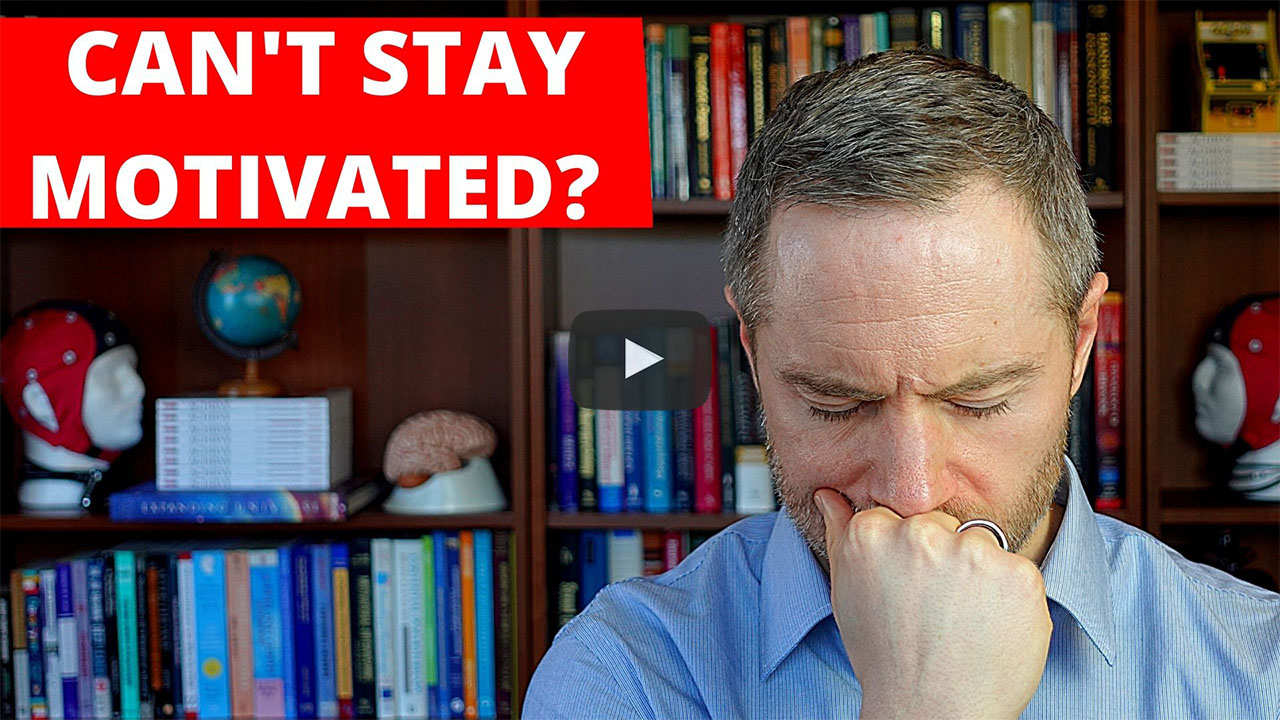VIDEO: Problems staying motivated?
VIDEO VERSION:
Problems staying motivated?
Ever find that you set a goal for yourself but start to peter out after a few days or weeks? Maybe you decided that you’re going to be getting up 30 minutes earlier to do cardio or work on that book you’ve finally decided to write. You start out with good intentions. You start out strong. Then you procrastinate. You know it’s important to you and you’re not sure what went wrong. You wonder how you’re going to reach your potential if you can’t keep on track and motivated.
Well, you’re not alone my friend! The truth is we all struggle with this. Earlier in my life, I struggled with sticking to my goals. In high school, I knew I should have been trying to get good grades by consistently studying, but I couldn’t get myself to follow through on these goals. It almost ruined my life.
In the almost three decades since my high school days, I’ve come a long way. I can now successfully set, stick to, and achieve my goals. It’s all thanks to applying what I’ve learned. This knowledge and other strategies I developed along the way in reading hundreds of self-help books, applying what I learned in my education in psychology, through my own trial and error, and what worked and didn’t work with my clients, changed my life for the better. It has also changed the lives of my high achieving clients.
Setting a goal is usually the easy part. But thinking that you can stay motivated by relying on the inspiration that motivated you to set the goal in the first place is flawed because it’s not in line with what we know about the brain. Something you find inspiring can only be inspiring for so long. Your brain simply can’t stay in a hyped-up inspired state for long. It’s designed to return to a state of equilibrium or balance. Some of you may recall this from grade 10 biology. It’s called homeostasis.
So many of us get inspired, often around the New Year, and then set New Year’s resolutions like “do more cardio” or “write my book”. You probably feel motivated and inspired enough to start these, only to find that over time your motivation wanes.
That’s why inspirational speeches, although highly motivating in the short-term, usually don’t lead to lasting change. Motivational speakers are highly sought after because they can stir up powerful emotions in the moment. When we feel strong emotions, we feel moved and inspired to act. But strong emotions don’t last. Our brains won’t let them. Strong emotions also prevent us from thinking clearly, like what it will actually take, or what you’ll have to give up, to find the time to work out or write your book. This is why relying on inspiration alone doesn’t lead to lasting progress.
Let me tell you a little secret that is backed by tons of scientific research. Real progress on big goals, whether it’s making the Olympic team, or writing your first book, doesn’t happen in a number of moments of inspiration. It happens because of hard and persistent work, day-in and day-out, regardless of your level of inspiration and motivation. It’s not as sexy as what you see in the movies. Get the idea that you need to feel inspired or motivated to work on your goals out of your head. If you allow it to stay there, you’ll never achieve your goals or reach your full potential.
The real secret to staying motivated and reaching your goals is to work on your goals NO MATTER WHAT YOU FEEL LIKE DOING. It doesn’t matter if you feel energized or inspired to get up early and hit the gym or work on your book. Just do it. You may find yourself saying “I’m too tired” or “I’m not feeling it today”. Just do it. The most important differentiator between those who achieve their goals and achieve great things and those who don’t is that those who achieve don’t allow their lives to be dictated by their immediate feelings, urges, level of inspiration, energy, mood, or immediate circumstances. They don’t let these states or circumstances dictate their actions. Instead, they decide what to do based on their deepest values, purpose, and goals — and then do the work regardless. If you understand and implement this one principle into your life, you’ll make real progress.
Inspiration is great, but not enough. So let me give you a little tip that is also backed by scientific research. It’s called the 5-Minute Rule.
The 5-Minute Rule is simple. When you don’t feel like doing something you know you should do, like get up and hit the gym or start working on a project, you make a deal with yourself. You agree to do the activity for 5 minutes and THEN decide whether you want to do it or not. The reality is our brains are biased to find fault in things and foresee pain when there is often nothing there. When we think of doing something that we are not in the mood to do, our brains naturally predict that it’s going to be a lot worse than it really ends up being. The only way to test this idea is to do it for 5 minutes. Make a deal with yourself. After 5 minutes, you can decide to stop. But you have to be serious. If it turns out to be as bad as or worse than you predicted, give yourself permission to stop. The reality is, 95 out of 100 times you’ll find that your predictions were wrong and you keep going.
This is one of THE keys to success. Implement it today and see for yourself!






